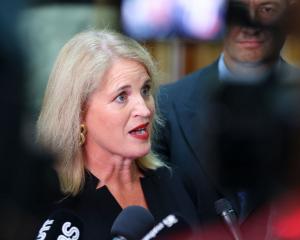The Labour Party has pulled together what could be seen as three unrelated events into a platform to again push for compulsory superannuation through KiwiSaver.
Thanks to the launch of the book on former Labour prime minister Norman Kirk - The Mighty Totara: the Life and Times of Norman Kirk - and the serendipitous release of an Infometric report on how New Zealand would look had Mr Kirk's superannuation scheme not be canned by a Rob Muldoon-led National administration, Labour finance spokesman David Parker had a chance to shine.
In yet another third coincidence, the Infometric report was released by Financial Services Council head Peter Neilson, a former Labour revenue minister and associate SOE and finance minister.
The report was funded by the Financial Services Council, in an election year when Labour wants to campaign on compulsory superannuation.
Given National's continued high polling in various popularity contests this year, Labour has to find a way of getting the attention of voters.
Mr Kirk still casts a long shadow over the country for older voters, particularly those in Labour who feel his time at the top was cut short.
Mr Kirk set up a form of compulsory superannuation which Infometrics said would be worth $278 billion by April 1, 2015, had the scheme continued.
An election year can give rise to a strange set of coincidences and yesterday was one of those days when they all came together.
The Infometrics report also estimated someone on the ''average wage'', saving over 40 years would have had a retirement nest egg of $256,000 at age 65 by April 1 next year.
The fund was built on 8% contributions - 4% from employers and 4% from employers - invested half in New Zealand bonds and half in New Zealand shares.
The nest egg invested in a bank term deposit earning 5.5% would fund a ''comfortable'' retirement, adding $234 a week after tax on top of the New Zealand super pensions which was currently $282 a week after tax for each person eligible in a married, civil or de facto relationship.
''This helps explain why three out of four adult New Zealanders think it was a mistake to scrap the 1974 superannuation scheme,'' Mr Neilson said.
Super fund investors would own a substantial proportion of New Zealand listed companies and the country would have a lower dollar, more New Zealanders on higher wages and fewer fast-growing companies would have to sell equity to foreigners to be able to grow, he said.
Was that a blow against the Government's asset sale programme?Mr Parker managed to take a swipe at National for canning the scheme back in 1975 and pointed to ''clear evidence'' why New Zealand needed universal superannuation.
And let's not forget Labour had other chances to reinstate compulsory superannuation under David Lange and others (six years) and Helen Clark (nine years) and failed to do so.
Mr Parker served as a cabinet minister in Ms Clark's government.
However, the Financial Services Council, Infometrics and Mr Neilson should be now wary about public perception.
Any thought the council and Mr Neilson had on being seen as neutral just disappeared.
Every utterance between now and the September 20 election will now be scrutinised closely for the hidden Labour-related messages.










